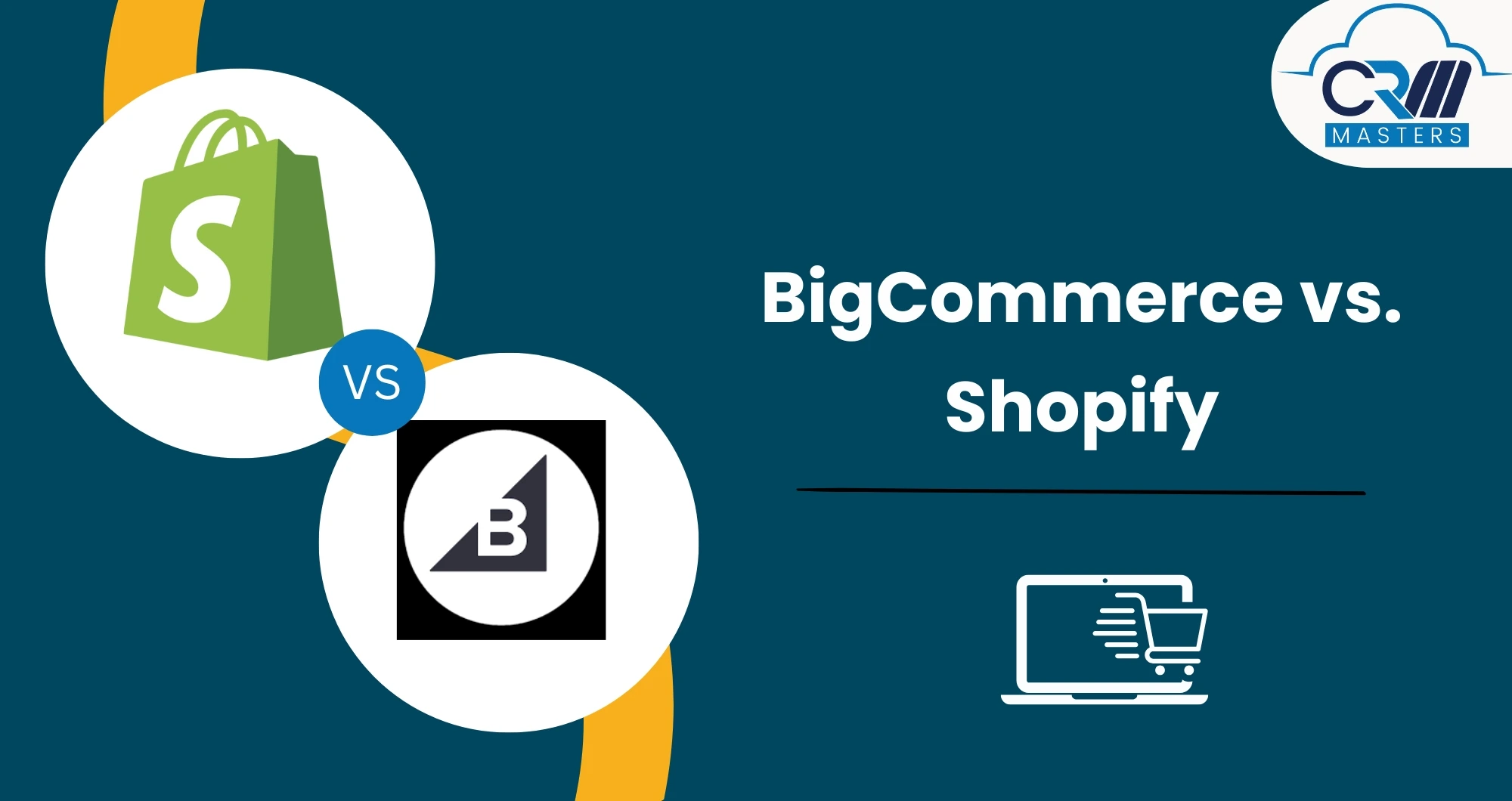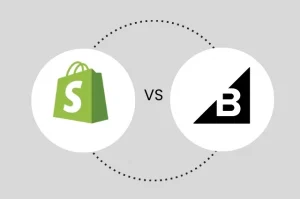
BigCommerce vs. Shopify: Which One Fits Your Business Best?
When you’re starting or scaling an online store, choosing the right eCommerce platform—like BigCommerce vs. Shopify—is one of the biggest decisions you’ll make. Your choice affects everything—from how you process payments to how you manage inventory, build customer relationships, and even handle customer support. Choosing the right Shopify Development Services also plays an important role.
Two of the most popular contenders in this space are BigCommerce and Shopify. While both are powerful platforms, they cater to slightly different business needs. So, which one is right for your business?
Let’s explore the detailed comparison of BigCommerce vs. Shopify, looking at ease of use, built-in features, scalability, app ecosystems, AI tools, support experience, and more.
Let’s Explore BigCommerce vs. Shopify

1. Ease of Use: Shopify Wins for Beginners
If you’re not a tech expert, Shopify gives you a smooth entry into the world of eCommerce for the basic implementation or integration. Its intuitive interface and visual drag-and-drop editor make it easy for anyone to set up and manage a store. If you need to implement complex integration, you might need to hire a Shopify Development Company.
Whether you’re uploading product images or customizing your homepage, Shopify’s admin panel is clean and beginner-friendly. You don’t need coding knowledge to create a good-looking store. Shopify also offers high-quality themes that are easy to tweak—even if you’re running your business from your garage.
BigCommerce, on the other hand, offers a slightly steeper learning curve. While its V3 control panel is well-organized, its page builder can feel clunky. If you want to make deeper customizations, you may need to edit theme files or understand more technical terms. It’s not a dealbreaker, but for non-developers, Shopify definitely feels easier to work with.
2. Built-In Features: BigCommerce Packs More
This is where BigCommerce shines. It offers a powerful suite of features straight out of the box. Need product reviews, customer segmentation, or multichannel selling tools? BigCommerce includes all of these—no extra apps required.
For example, you can:
- Create customer groups and offer unique pricing.
- Manage listings across Amazon, eBay, and Facebook using its built-in Channel Manager.
- Handle B2B sales more easily with tools like price lists and catalogs.
Shopify relies heavily on its App Store. You’ll find a solution for almost any functionality—but that can mean more monthly costs and more tools to manage. While some essential apps are free (like Shopify’s own review app), others come with a subscription fee.
So, if you’re looking for a platform that’s already stacked with features without extra installations, BigCommerce may be the better fit.
3. AI Features: Shopify Has the Edge
Shopify takes a strong lead in AI tools. Its suite, called Shopify Magic, helps with:
- Writing product descriptions
- Editing product images (like removing backgrounds)
- Generating FAQs
- Crafting email content
- Chat support suggestions via Shopify Inbox
What really stands out is Shopify Sidekick, an AI assistant built into the dashboard. It guides you through tasks, suggests improvements, and even helps you understand analytics—like a smart teammate you didn’t know you needed.
BigCommerce is developing its AI tools under the “BigAI” name, but most of its advanced features are reserved for enterprise users and are still in development. The only AI tool currently available to all plans is a basic product description generator.
4. Scalability: BigCommerce for Complex Needs
Planning to manage multiple brands or sell across regions? BigCommerce is designed for that.
You can run multiple storefronts (with different branding or regions) from one BigCommerce account—even on lower-tier plans, though each storefront has an extra fee. Shopify only offers this on its enterprise-grade Shopify Plus Pricing plan, which starts at approximately $2,300/month.
BigCommerce also supports:
- Up to 600 product variants
- More flexible price controls
- Better B2B support
Meanwhile, Shopify limits you to 100 product variants (though this might change soon). If you sell complex products like clothing with several sizes and colors, that limit can be restrictive.
5. App Ecosystem: Shopify Dominates
When it comes to apps, Shopify is unmatched. With over 13,000 apps in its marketplace, you can find tools for everything—from marketing automation and loyalty programs to advanced analytics and third-party logistics. It’s also easier to find Shopify experts due to the platform’s popularity.
This vast ecosystem means you can customize your store endlessly—but be prepared for potential subscription fees for premium apps.
BigCommerce also has around 1,300 apps, but the need for apps is reduced because of the platform’s built-in features.
6. Pricing: Close Call, But Consider the Extras
Both platforms offer similar base pricing:
- Shopify: Starts at $39/month
- BigCommerce: Starts at $39/month
However, Shopify charges transaction fees if you don’t use Shopify Payments.
If you use Shopify Payments, there is no fee, but there is a transaction fee if you use any other Shopify payment method in your account.
BigCommerce does not charge transaction fees, no matter which payment gateway you use.
BigCommerce also enforces sales limits on plans. If your annual sales exceed a set threshold, you’ll be automatically upgraded to a higher plan. Shopify doesn’t have this restriction.
So, depending on your payment method and sales volume, your costs might vary.
7. Customer Support & Contact Options
When running an online store, having access to reliable Shopify customer support can make a huge difference. Whether you need to contact Shopify support for technical issues or simply want to call Shopify support for quick guidance, the platform offers multiple assistance options to help store owners stay on track.
Shopify offers:
- 24/7 live chat and email support
- Phone support (though limited in some regions)
- A comprehensive Help Center
- A large and active community forum
To contact Shopify support, go to their Help Center, log in, and choose the preferred method—chat, email, or call (if available in your region). Many users appreciate Shopify’s detailed guides and fast support response.
BigCommerce also offers:
- 24/7 live chat and phone support
- Ticket-based email support
- A solid knowledge base and community forum
Both platforms are pretty responsive, but Shopify’s broader user base and global presence often translate to faster help and more third-party resources.
- Choose Shopify if you want a smooth start, love visual design tools, and want to scale using apps. It’s especially good for beginners, growing brands, and those looking for strong AI and design flexibility.
- Go with BigCommerce if you run complex operations, need more out-of-the-box features, and want the ability to scale across storefronts without jumping to enterprise plans.
Need Help Setting Up on Shopify?
Whether you’re just getting started or want to customize your store, working with the right experts can make a big difference.
Looking for a trusted Shopify development company? Our team of certified Shopify experts and experienced Shopify developers is ready to help you build, scale, and manage your online store—without the headaches. From theme customization to app integration and ongoing support, we’ve got you covered.
Contact us today and let’s create something amazing together.












